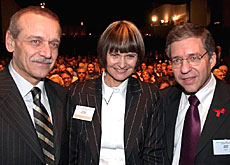
New peace plan gets off the ground in Geneva

Prominent Palestinians and Israelis joined former US President Jimmy Carter in Geneva on Monday to launch a Swiss-backed peace plan for the Middle East.
The ceremony was a sombre but hopeful affair, featuring music, videos and speeches from international personalities.
The American actor, Richard Dreyfus, opened the event by saying that the accord represented a “new starting point” for peace in the Middle East. “To sum it up in one word, this initiative represents hope,” he told swissinfo.
In a speech before 500 representatives of Israeli and Palestinian civil society, Swiss foreign minister Micheline Calmy-Rey called the accord “a little light shining in the darkness”.
She added that she was proud that the project had come to life in Switzerland, but she emphasised that the country’s role had been as a logistical and financial facilitator.
Her speech was followed by an address by Carter, who received a standing ovation when he came onto the stage.
He began by saying that the agreement would resolve many of the divisive issues, including border delineations, the occupation of Palestinian land and the “extremely troubling question of Palestinian refugees”.
Carter added that the alternative to the accord was “sustained and permanent violence”.
International challenge
The Geneva Accord outlines a plan for the division of Jerusalem and the creation of a Palestinian state, and also covers other contentious issues such as the return of Palestinian refugees and the removal of most Jewish settlements in the occupied territories.
It was initially signed in Jordan on October 12 by the former Israeli cabinet minister, Yossi Beilin, and his Palestinian counterpart, Yasser Abed Rabbo, who brokered the deal during two years of secret talks.
But both sides said Monday’s symbolic ceremony represented a new and more dynamic phase in their efforts to sway public and political opinion in favour of the accord – both in the Middle East and abroad.
“We are going to the people and to the international community with a challenge that peace is possible and that the current crisis is not the only way forward,” said Ghaith Al Omari, a Palestinian representative.
“There is now a choice and it’s up to them to choose, domestically and internationally,” he added.
Al Omari’s Israeli counterpart, Daniel Levy, echoed his statement by saying that their message to the international community was that “the conflict is not intractable and that there are solutions”.
Commenting on the cross-section of Israeli and Palestinian civil society represented at the ceremony, Levy said that the various groups understood that “for their causes, concerns and constituencies, nothing is more important than making peace”.
Al Omari said the broad scope of participants reflected the “central message” of the accord that “politics and peace cut across everything”.
Seeking support
Over the past two weeks, copies of the peace plan have been distributed to every household in Israel and published in Palestinian newspapers, in an effort to boost domestic awareness of the 50-page document.
In a recent survey by Texas’ Rice University and the International Crisis Group in Washington, 53.3 per cent of Israelis polled said they would support the proposal, while 43.9 per cent said they would oppose it.
On the Palestinian side, 55.6 per cent expressed support and 38.5 per cent were opposed to the accord.
But the initiative has met with stiff opposition from the Israeli government, with the Israeli prime minister, Ariel Sharon, insisting that the United States-backed “road map” is the only route to peace in the Middle East.
Road map
Both the Swiss government and the negotiating teams insist that their plan is not a substitute for the road map.
“The road map is the only official game in town and as such, it’s something we’re committed to and in no way trying to undermine,” said Al Omari.
He added that the Palestinian leader, Yasser Arafat, had expressed support for the Geneva Accord but had not officially endorsed it.
“We do not expect him to endorse the agreement when there is no partner on the Israeli side,” said Al Omari.
“If we reach a point that the Israeli government is willing to endorse and support this kind of initiative, then we can expect Arafat and the PLO [Palestinian Liberation Organisation] to express a position on the content.”
Meanwhile, the US Secretary of State, Colin Powell, has backed the initiative, calling it both “important” and “potentially useful”.
According to Levy and Al Omari, a mixed Palestinian and Israeli delegation is expected to travel to Washington this week, although a meeting with Powell has not yet been confirmed.
swissinfo, Anna Nelson in Geneva
An unofficial, Swiss-backed peace plan for the Middle East was launched in Geneva on Monday, during a ceremony involving around 400 Israelis, Palestinians and international personalities.
The initiative, known as the Geneva Accord, was brokered during two years of secret talks and covers many divisive issues between Palestinians and Israelis.
The agreement outlines a plan for the division of Jerusalem and the creation of a Palestinian state, and covers the issues of Palestinian refugees and Jewish settlements.
Promoters of the deal, which has been criticised by the Israeli government, said an international campaign was underway to win support for the accord.

In compliance with the JTI standards
More: SWI swissinfo.ch certified by the Journalism Trust Initiative





























You can find an overview of ongoing debates with our journalists here . Please join us!
If you want to start a conversation about a topic raised in this article or want to report factual errors, email us at english@swissinfo.ch.